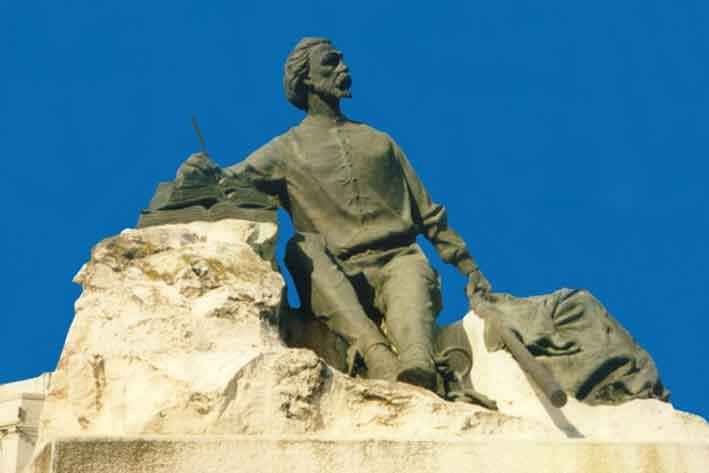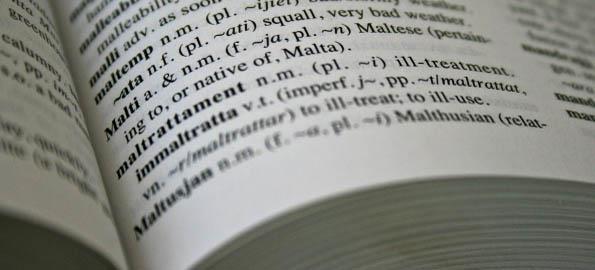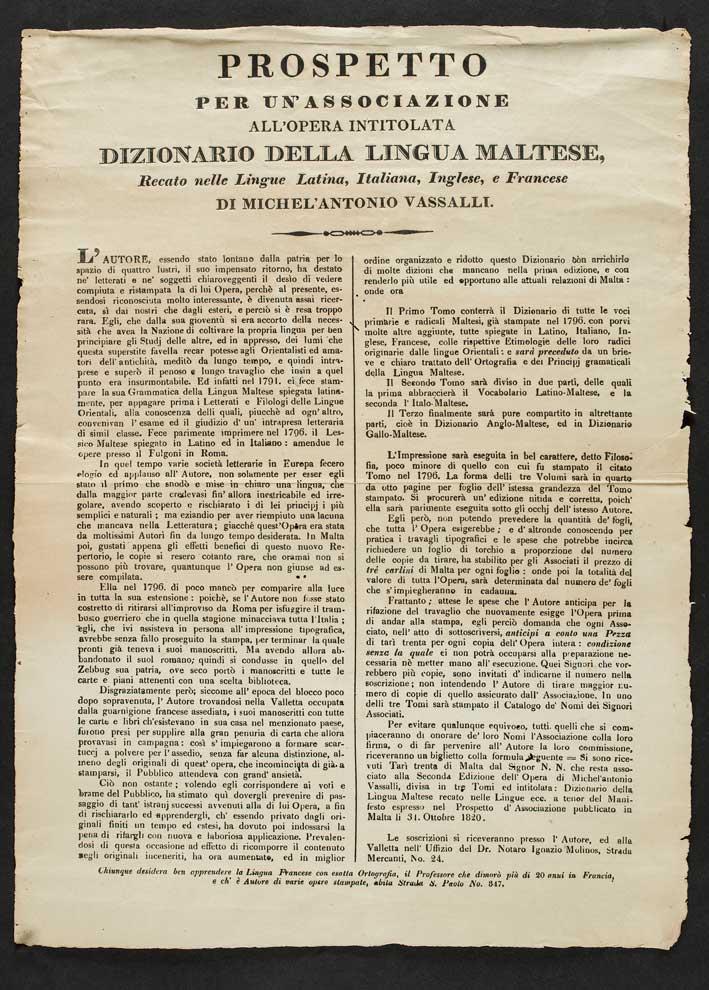An advert promoting the unpublished second edition of Mikiel Anton Vassalli's dictionary was recently discovered, shedding more light on the works of one of the forefathers of the Maltese language.
The prospetto, discovered by Paul Catania, was found in the archives of the Naxxar parish church. A few years ago, Mr Catania had discovered letters sent by Vassalli to parish priest Giorgio Fiteni.
In 1796, Vassalli published the vocabulary of the Maltese language, Lexicon, which contained over 18,000 words. His second book was intended to be more useful for Malta's relations at the time and Vassalli was already accepting subscription fees to print the requested copies. The manuscript however was never discovered and it is thought that it might have fallen into Protestant hands. In the 1826 May edition of the Government Gazette, readers were informed that Vassalli could not publish his new manuscripts of the Dictionary because the fonts with the required special characters were not available in Malta.
The dictionary, unlike the first edition, was to include translation of words from French into Maltese. Vassalli was fluent in French, having lived in France for a long time, however as far as researchers know, he never learnt English, and his inclusion of the language in the promoted dictionary is questionable.
Professor Frans Ciappara, author of 'M.A Vassalli: An enlightened Maltese reformer' has one theory. "Notary Ignazio Molinos is known to have worked with Dr Cleardo Naudi, one of the first Maltese to become a Protestant. Did the notary introduce Vassalli to Naudi who in turn introduced Vassalli to the Protestants?" he questions.
In comments to The Malta Independent on Sunday, the professor explains that in 1796, while preparing to print the second volume of the Leixcon, Vassalli was forced to leave Rome to escape Napoleon, who he referred to as a 'scatter-brained warrior'. When he returned to Malta, he brought the manuscript with him, but when the residents of Zebbug rose up against the French in 1798, they broke into Vassalli's home and used his books and manuscripts as paper for cartridges.
Vassalli started the dictionary from scratch in 1820, but this time the dictionary was enriched with new words, given the changes Malta was going through.

Vassalli's beliefs
Whether Vassalli was a Protestant or not remains questionable. During his young days, Vassalli was interested in entering the priesthood, but because he did not have enough money to pay for his tuition he was not accepted.
"Back then, the parish priest used to hand out a document (bullettin) one used to trade for communion every year or so. Vassalli however was not an active member of the Church, and the parish priest listed his residency as sospetta - meaning suspected of being a Protestant. When he died, he was refused burial in the church cemetery, and it was the Protestants who buried him," Prof. Ciappara explains.
However, one of his close friends claims that he was not a Protestant. It is possible that he was an deist, believing in God but not in the Church.
When Malta was a British colony, a number of British missionaries visited the island trying to spread the word. Vassalli was responsible for translating the Act of the Apostles and the Four Gospels into Maltese - publications which were printed in London.
Vassalli is a man of mystery, because questions still surround his life and beliefs. "I would definitely love to have some certainty on whether he was a Protestant or not. I would also like to discover his wedding certificate; we are sure he got married in France, but whether his wife was already a protestant is inconclusive. He called himself a professor, but I have checked all university registries in Rome and he is not listed. However, he could have taught a language, possibly Arabic, in a secondary school," Prof. Ciappara said.
"If you decide to carry out some background work on Vassalli, you probably wouldn't find what you're looking for. But through other research, some interesting facts popped up. During research, I found a certificate from the Arabic schools in Malta referring to him as Mikiel Angelo Vassallo."

Vassalli's contribution to the Maltese language
Vassalli's grammar and orthography is still being taught in schools today. The language back then included sounds which are no longer used. Dahar for example used to be pronounced da-aħ-ar - with an emphasis on the ħ. But the words were too difficult to write, and sometimes deemed impossible.
He first thought that the Maltese language was derived from Punic, only for a French expert to later inform him that it was derived from the Arabic spoken in North Africa. He gave great importance to all that was Maltese and disqualified certain words, despite them still being used by the people.
Vassalli envisioned the education system as we know it today. In the Lexicon's introduction, Vassalli proposes a free elementary education for all, identifying what subjects should be taught, placing emphasis on the Maltese language.
Prof. Ciappara explains that little is known about Vassalli's personal life, except that he lost his father at a very young age, and that his family was very poor. His mother later re-married but her husband was sent to prison for failing to pay rent on the land he leased from the Church .
"I do hope that this manuscript - that of the new Lexicon- is discovered one day. There are claims that following Vassalli's death, his wife intended to give his manuscripts to the landlord as rent, but the missionaries intervened and took them for themselves," Professor Ciappara says.

Prospetto introduction: Having been away from home for 20 years, following his unexpected return, the author expressed his wish to scholars to see the completion and printing of the opera, which has been recognised as being very interesting and researched by many, both from by compatriots as well as others, rendering it very rare.
Since his younger days he had understood the necessity of the nation to cultivate its own language to be able to start studying others and, by doing so, act as enlightenment for the Orientalists and lovers of antiquities. He meditated on this for a long time and was able to embark on a long and difficult voyage to overcome what had seemed insurmountable.